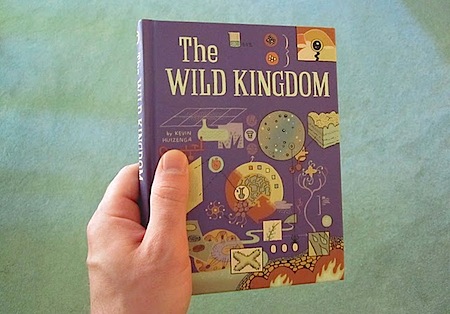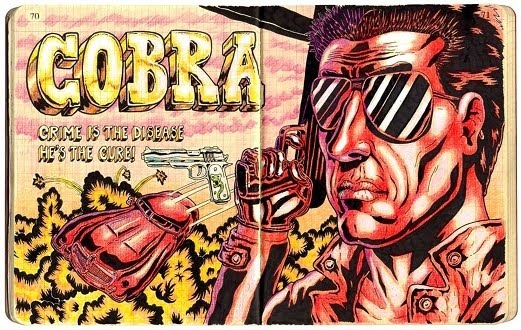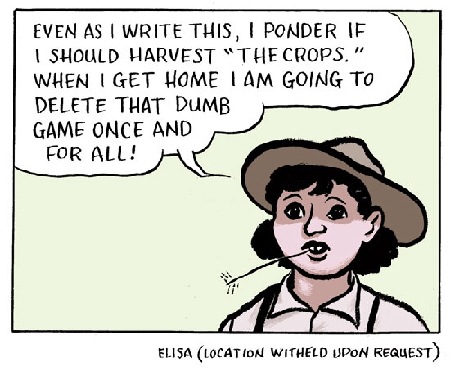While this week’s news cycle is sure to churn fiercely, here’s everything you need to get you up to speed:
§ Picturebox has a new website that is awesome and allows you to read and buy stuff. Above, the painting “Orange Eyes” by Mat Brinkman, yours for only $350.
§ SOmehow we missed the news that Chris Ryall has been promoted to Chief Creative Officer at IDW. Congrats, Chris!
§ In case you issed this from our comments, Michael Netzer explains the behind-the-scenes of one of our Wonder Woman cover gallery slsections, and to the surprise of no one, Vinnie Colletta is to blame yet again!
“Only two issues later and an almost identical pose, this time by Mike Nasser. Editor Denny O’Neil, where were you!”
Almost identical because they were laid out with strict instruction by the same art director of DC at the time, inker Vinnie Colletta.
Policy at DC had it that the art director’s authority on art overrode the editor’s. Hence, Denny’s acquiescence.
§ Jeet Heer on the need for criticism:
If you click here you’ll find a podcast of a lively discussion of Ben Schwartz’s Best American Comics Criticism. Panelists include Schwartz himself as well as R. Fiore, Brian Doherty, Sammy Harkham and Joe Matt. Lots of contentious ideas are put forward (and some Comics Comics regulars are insulted) but I want to focus in particular on Matt’s statement that he doesn’t need to read criticism because he can decide for himelf what’s good or not. That’s not an uncommon opinion and I think the proper response to this contention depends on what we mean by “criticism”. If we define criticism narrowly as analytical essays on an art form or particular works of art, then it’s true that criticism is a minority interest. But if we define criticism more broadly as any discussion of art or works of art, including conversations and the response of artists themselves to earlier art, then criticism is as unavoidable and essential as art itself.
§ Scott McCloud vs Roger Ebert! Not really, but isn’t that what the internet is all about?
§ Or, so says Esther Inglis-Arkell in an essay on the joys of the internet flame fest:
What the internet gives us is the near-unprecedented ability to witness a hissing, spitting, hair-puller of a fight without ever having to get personally involved. A bickering married couple at the next table over is a good way to spend time while waiting for friends at a coffee shop, until they start asking you to take sides, or giving you the stink eye.
§ What DC Comics looked like in 1978, as Christopher Reeve shows what a class act he was by acting like he was pleased as punch to be meeting then president Sol Harrison. [Via The Comics Reporter]
§ Somewhat related: Mark Evanier recalls his first visits to Marvel and DC back in 1970, and also touches on the fundamental truth of time and memory:
The high point of the trip — the convention — commenced on Friday, July 3, forty years ago today. That morning, I met in person, my pen-pal of several years, Tony Isabella. We went to breakfast with Al Williamson, Dick Giordano and Frank McLaughlin and spent the day meeting other folks in the comic industry, as well as fellow fans I knew through correspondence and the fanzine network. The latter group included Martin Pasko, Alan Brennert, Gary Groth, Martin Greim, Guy Lillian and Bob Beerbohm. Over the three days of the con, I also met Frank Frazetta, Wally Wood, Jim Steranko, Joe Sinnott, Gene Colan, Archie Goodwin, Tom Sutton and a few dozen others. It was a three-day conference but so much happened and so much was new and exciting that it felt like three weeks. Today, a four-day con in San Diego feels like it’s over in about four hours.
§ Also at the Comics Reporter, a transcript of Tom Spurgeon interviewing Richard Thompson at Heroes Con.
You have to have so much exposition for a joke sometimes. You always want to have the characters identified. “Hello, Alice.” “Hello, Petey.” Something like that. But at a certain point you can assume some familiarity that this character is this way. She’s a little fireball; he’s a reticent kind of hesitant wallflower. People sort of know who you’re talking about. They know that this kid with the spiky hair is kind of a mooncalf. At the same time you have to put a little exposition in, which is okay with a kid strip, because kids are always saying, “So what are we doing?” “Where are we going?” “Mom, what’s going on?”
§ Wilson by Daniel Clowes is reviewed in the New York Times Book Review and those of you who had money on a reference for Lermontov in the first ‘graph can collect your winnings later:
Say hello to Wilson, the eponymous hero of Daniel Clowes’s latest novel-in-comics. Perhaps he is a hero of our time. But if that phrase makes all you comp-lit majors think of Lermontov’s Pechorin, think again: this haggard, middle-aged fellow is no dashingly depressive duelist or seducer. Wilson hectors people in coffee shops and hits on his ex-wife with sweet nothings like, “As you know, I certainly never minded a larger woman.”
§ I know this was linked to previously but remember NEW JASON!
§ Speaking of great cartoonists, new Kevin Huizenga is manifest.
§ Benjamin Marra and Rambo? Sign me up!
§ James Sturm still isn’t answering his emails!
§ This was more relevant when we bookmarked it last week: Gene Yang on the Last Airbender’s racial misfires
I do want to make one point, though. Director M. Night Shyamalan claims that The Last Airbender is “the most diverse tentpole movie ever.” Pleeease. Having your Caucasian-playing-Inuit protagonists deliver exposition against a background of actual Inuits does not make your movie diverse. It makes your movie a modern-day equivalent of Charlie Chan.
Since then the movie has made $53.3 million, despite HORRIBLE reviews.
§ Jim McLauchlin’s piece on Wally Wood is must reading.
The County of Los Angeles keeps seven pages on file pertaining to Wally Wood. The pages are maintained by the Department of Coroner, as part of its mission is “the investigation and determination of the cause and manner of all sudden, violent or unusual deaths in the County.”
The death of Wally Wood certainly fits all those categories. Sudden. Violent. Unusual.
§ The Dark Horse blog appreceiates Usagi Yojimbo which is always a good start.
§ Bonus: Thank god for YouTube: NSFW







